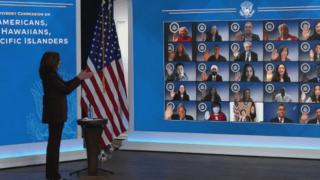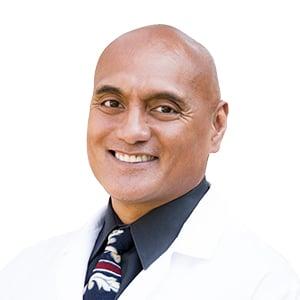Raynald Samoa, M.D., gets emotional when he remembers what his grandmother would tell him.
“She’d say, ‘I wrap my love for you in your shadow,’ meaning her love would always be with me,” he recalled. “So I’d ask, ‘But Grandma, what about when it’s dark out?’ And she’d answer, ‘That’s when it surrounds you!’”
It must run in the family.
Talk to Samoa’s patients, and you come away with a portrait of a physician with all-enveloping empathy for those in his care.
“Patients love him,” said Ravi Salgia, M.D., Ph.D., professor and chair of the Department of Medical Oncology & Therapeutics Research and the Arthur & Rosalie Kaplan Chair in Medical Oncology. He’s known Samoa for six years. “He’s kind, compassionate, intellectual. He’s an incredible physician and a true leader.”
When a longtime nurse practitioner at City of Hope found herself suddenly hospitalized for diabetes, Samoa treated her as both a patient and a fellow professional.
“He respects your expertise,” she recalled. “He meets you where you’re at. He spoke to me like a nurse practitioner and instructed the other doctors there to do the same. He is amazing.”
At City of Hope since 2008, Samoa, an assistant clinical professor in the Department of Diabetes, Endocrinology & Metabolism, exudes empathy the way others use a stethoscope: it’s an essential tool.
“It’s the most important thing,” he said. “You can never know everything you need to know about a patient. Empathy helps you learn more.”
And teach more.
A proud Pacific Islander who grew up in Hawaii, Samoa advocates passionately for his community. As of Feb. 3, he’s elevated those concerns to the highest level, when he was named a member of President Joseph Biden’s Advisory Commission on Asian Americans, Native Hawaiians and Pacific Islanders. According to the White House, the goal of the commission is to “advise the President on ways the public, private, and non-profit sectors can work together to advance equity and opportunity for every Asian American, Native Hawaiian, and Pacific Islander (AANHPI) community.”
President Biden formally authorized the commission through Sept. 30, 2023, via an executive order in September, allowing the body to operate within the Department of Health and Human Services for two years before requiring another renewal.
The Covid-19 Connection
Samoa’s path to the Biden administration runs through the COVID-19 virus.
COVID-19 knocked him out for two weeks in March 2020 (he has since battled the virus a second time). While recuperating, he wondered about the virus’s impact on fellow Pacific Islanders. Very few states were collecting such data at the time, but those that did told a grim story: Pacific Islanders accounted for some of the highest infection and mortality rates.
“I looked around for a way to help,” said Samoa. He expected to find an organization dedicated to fighting COVID-19 in his community. “But there was nothing.”
So he started one.
“I did what Pacific Islanders do,” he said, smiling. “I called all my friends, relatives and colleagues to see what we can do.” Plus he (gently) twisted a few arms. “As an endocrinologist, I had already done considerable outreach on my own dime. So now I called in a few favors.”
He co-founded the Pacific Islander COVID-19 Response Team. The group aims to increase the amount of available data specific to the Pacific Islander population, develop and train more healthcare providers for the community, and provide reliable COVID-19 information, resources and support. “Getting COVID-19 taught me to ask questions about access [to health care] for all,” he said.
His work attracted attention. In May 2020, Samoa appeared before the U.S. House Ways and Means Committee during a session on “The Disproportionate Impact of COVID-19 on Communities of Color”; he believes this is how he landed on the White House radar. In his testimony, he urged lawmakers to recognize that many Pacific Islanders are essential workers who suffer disproportionally from COVID-19 and other illnesses because of, in his words, “less money, less education and more suspicion [of vaccines].”
Links Between cancer, diabetes
He keeps those deficiencies in mind when treating his City of Hope patients, always trying to learn more about them and meet them in their own space. “We’re not all going to be equal tomorrow,” he says. “So I have to figure out how to fill those gaps. That’s how I deliver care. I know what these folks go through, and I know it’s not their fault.”
Nevertheless, he bristles when patients — even in his own family — adamantly refuse to get vaccinated for COVID-19 because of misinformation they’ve read on social media and elsewhere. “They say they did their own research,” he scoffs. “That’s not research. It’s ‘me-search’! I’ve dedicated my life to keeping the body healthy. These guys online have not ... most aren’t even doctors ... and they have no accountability.”
Samoa, who was recently named a “Top L.A. Doctor” by the Los Angeles Business Journal, specializes in treating diabetes patients who are also battling cancer. He calls the diseases “almost two heads of the same dragon. There are so many parallels.” He works hard to help patients make diet and lifestyle changes that can alleviate both illnesses. Oncologists like Salgia frequently refer their patients to him. The two physicians also collaborate on research projects to try to tame that “two-headed dragon.”
“We are working together to reduce toxicities,” explained Salgia. “We know, for example, that certain immunotherapies for treating lung cancer can cause thyroiditis [an inflammation of the thyroid]. Some cancer patients can also develop so-called ‘brittle’ diabetes, which doesn’t respond to normal treatment.
“We want the therapies, not the toxicities.”
Samoa feels lucky to be where he is.
His early upbringing had nothing to do with medicine. Raised in a military family — his father spent 30 years in the Army; many relatives and friends have also served — Samoa was discouraged from enlisting. “My father thought I didn’t have the discipline for it,” he remembers. Instead, he focused on a business career, studying accounting in college until he realized “I liked the science classes more than the business ones.”
He found medical school difficult, but “endocrinology was easy.” He started in pediatrics (he still sees young patients, including the 8-year-old son of the nurse practitioner), until mentors fostered his interest in diabetes and guided him to City of Hope, a place he calls “pretty amazing.”
“There have been no wasted moments in my life,” he reflected. “Even catching COVID-19 added to my total experience.” Though some of those experiences are more bitter than sweet — an uncle succumbed to the virus a year ago — Samoa turns them all into motivators that give his life and work meaning and purpose. As he wrote recently on Facebook:
“I asked for courage and I was given a pandemic to endure.
I asked for strength and I was given COVID to battle through.
I asked for wisdom and I was given death and misinformation to solve.
I asked for guidance and I was given leadership.
I asked for Love and I was given heartbreak to journey through.
Ask and you shall receive.”

